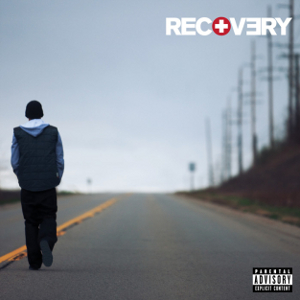
Eminem
Recovery
(Interscope/Aftermath/Shady; 2010)
By Chris Molnar | 30 July 2010
Recovery is where Eminem gets Toy Story 3 on our asses, cashing in on his proficiency and his history. And while I’m not necessarily interested in re-watching Toy Story 2, that doesn’t mean the way 3 brought back memories of 2 didn’t destroy me from beginning to end. Similarly, I am powerless in the face of Eminem-as-discarded-toy armed with a couple Michael J. Fox jokes to remind us what we used to love him for. Because, even though Recovery is one of those too long, too dour, MACHINA (2000)-esque projects that tend to get forgotten immediately, no one listens to Eminem for concision or pleasantries—and if he can’t actually shock anymore, he’s going to sit on the mic for as long as a CD’s running time allows.
More than anything the album is proof that with an easily identifiable, internationally beloved skill set, you have to have Encore or Relapse levels of disinterest in yourself in order to fail, and even then it’s difficult to not go platinum. Recovery’s navel-gazing is sold to us by reminding us that we didn’t expect it to be unexpected (right?), that it is and always was what we liked along. Hearing Eminem trying to rap his way out of Haddaway’s clutches—“more alive than I have ever been in my entire life” cliches aside—going double time while Weezy acts like the ultimate hype-man he is: this accesses the middle-school part of my brain, the part forever taping “Stan” off the radio and memorizing every inch. It’s just no longer a metafictional desperation he’s peddling, now it’s a knowing, controlled desperation: the oft-quoted admission of feeling inferior to Kanye and Lil Wayne, the general lyrical aura of self-therapy, his struggle to be self-constructive (for once), this simple drama is how he catches us now.
In a society already inured to Drake, our collective investment in Em’s personal drama makes Recovery surprisingly affecting. And every song is as earnest as the last; even the “W.T.P.,” (which boasts the most interesting, non-sledgehammer-y beat on the album) the minivan-driving Michigan ode, is shot through with too much melancholy to be a real joke track. Since we constantly expect “We Made You” to suddenly be eclipsed in the same unimaginable way it eclipsed “Just Lose It” in terms of shittiness, every minor accomplishment in tastefulness throughout Recovery is startling. “Perhaps I ran them accents into the ground,” he says as part of a litany of apologies on “Not Afraid,” and while that might not do wonders for recent back catalog sales, it’s an appreciated reminder of what we already knew, which is that we don’t have to apologize for him anymore—that he can do it himself.
The essence of Eminem is not funny. It’s not inspirational, nor is it ambitious. It’s angry, one constant note, Eminem, uncomfortably aware of his public image, crescendoing over solid beats over and over again. Here is an album I would be fine listening to out of every car and window (which I am—this is the summer album, his first in almost a decade) or never again. The monolithic nature of the album feels necessary, but like any sustained chord, every other song tends to have less interesting undertones. Rihanna is welcome, bringing the same boosterism she brings choruses everywhere, but Pink? Even Pink’s albums could do without Pink.
And ultimately my interest is sociological. Only Eminem could take a pop culture reference as dated as Cinderella Man and automatically have it be more current than everything he talked about last year (while the stomp-and-clap beat and perfectly odd male harmonies would make it notable on any album). “Music is my time machine,” croon the backup vocalists, and the shit that usually makes Eminem intolerable turns endearing. On the reverse side, the acoustic guitar of “Space Bound” nods to vanquished foe Everlast, the stiff unction of the ’90s production helping transform Eminem’s constipated, angst-filled flow into the brief joy of something like Tyson, where the spectacle of someone who used to only communicate via violence haltingly talks about aches, pains, and love.
And as far as pop stars go, Eminem makes the rest of the charts look like amateurs in terms of ability to craft a hook ex nihilo; the crudeness of “Not Afraid” or “Cold Wind Blows’” sing-song choruses make them and everything else you’ve sung along to by him more impressive. Just by picking out a few notes in his taunting lilt he can place some interior rhymes in the Top 10? And this doesn’t even begin to analyze the lyrics, of which there are many (“Not just gonna rhyme one syllable,” he reminds us on “Seduction”), and which at this point are almost necessarily taken for granted because Eminem has set the bar so high for himself that they’re just a distraction from the question of whether he’s as amazing as he used to be. This is not a revelation, exactly. But a reminiscence is close enough.





